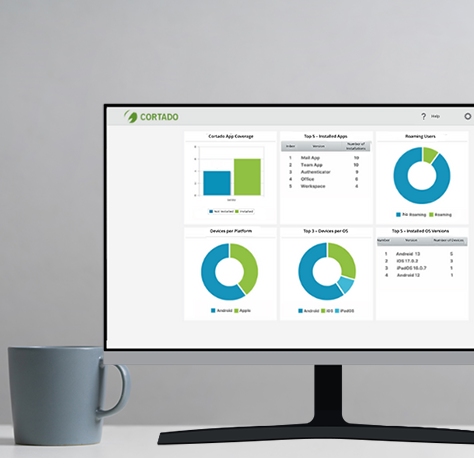Learn which everyday actions on smartphones can lead to data privacy violations in your company and how to prevent them.

Sometimes, it’s the seemingly harmless actions that have serious consequences – a team member quickly forwards a business email to their personal inbox or syncs their work contacts with WhatsApp – and a data privacy breach is already in motion.
This risk is especially pronounced when mobile devices are used for both personal and professional purposes, putting companies at odds with the strict requirements of data protection legislation such as GDPR. Even minor missteps in handling mobile devices can lead to significant data privacy violations and hefty penalties.
Common Actions Leading to Data Privacy Violations on Smartphones
1. Forwarding Emails to a Personal Inbox
Forwarding business emails containing personal data to a personal email account without proper security measures can lead to unauthorized access to sensitive information.
2. Uploading Business Contacts to WhatsApp
Uploading business contacts to private apps like WhatsApp, which store data on external servers, risks data protection violations due to the lack of consent from the affected individuals.
3. Storing Company Documents in Unauthorized Cloud Services
Saving sensitive corporate documents in cloud services not approved by the company exposes data to potential breaches, as the security of these services is not guaranteed.
4. Sharing Personal Data via Unsecured Messaging Apps
Sending personal data (e.g., customer information or salary details) through unsecured messaging apps like SMS or non-encrypted applications jeopardizes the confidentiality of the information.
5. Automatic Syncing of Contacts with Third-Party Apps
Allowing automatic synchronization of business contacts with third-party apps (e.g., social networks or personal apps) without prior consent from the individuals violates data privacy laws.
6. Using the Device Camera for Business Documents in Unsecured Apps
Capturing photos of sensitive documents with unsecured camera or gallery apps can result in unauthorized access to those images.
7. Accessing Business Data via Public Wi-Fi Without a VPN
Retrieving corporate data over unsecured public Wi-Fi networks without using a VPN (Virtual Private Network) makes data vulnerable to interception and attacks.
8. Transmitting Sensitive Data via Bluetooth Without Security Measures
Sending sensitive files or contact information over unsecured Bluetooth connections allows third parties to intercept and misuse the data.
9. Auto-Syncing Business Calendars with Personal Calendar Apps
Automatically synchronizing business appointments containing sensitive information (e.g., client meetings or confidential project discussions) with personal calendar apps can expose the data without adequate safeguards.
10. Storing Company Passwords in Private Password Managers
Saving corporate passwords in unauthorized personal password managers poses a security risk, as access to these tools is often unmanaged and unregulated by IT.
11. Sharing Client Data via Unsecure File-Sharing Apps
Sending client data or confidential information through unsecure file-sharing apps (without encryption) can lead to unauthorized third-party access.
12. Using Unauthorized Apps for Work Tasks
Using unauthorized or unsecured apps for professional tasks like managing customer data or creating documents opens potential security gaps and risks unauthorized access to personal data.
By identifying and addressing these common pitfalls, businesses can significantly reduce the risk of data privacy violations and maintain compliance with data protection regulations such as GDPR.
Measures to Prevent Data Privacy Violations on Smartphones
To avoid data privacy violations on smartphones, companies should establish and enforce clear policies for handling mobile devices.
The use of Mobile Device Management (MDM) is crucial in preventing such breaches. With MDM, businesses can implement security measures like encryption, remote wiping, and access controls, while ensuring a clear separation between personal and corporate data through containerization. Additionally, VPNs can be configured for secure connections, and the installation of unauthorized apps can be restricted.
Regular employee training on data security and safe app usage is equally important. Awareness programs help minimize the risks of everyday smartphone actions and foster a security-conscious mindset that supports responsible mobile device usage.
In summary, comprehensive protection against data privacy violations on corporate phones requires not only modern technologies like MDM but also clear policies and well-informed employees. This enables businesses to safeguard their mobile data effectively while ensuring the secure and productive use of mobile devices.

Enjoy the Ease of Mobile Device Management
With Cortado MDM, you’re ready to go right away and can manage mobile devices easily and securely.